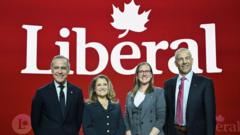In a competitive debate, candidates from the Liberal Party shared their stances on Donald Trump and domestic issues amidst the backdrop of Justin Trudeau's impending resignation.**
Liberal Leadership Aspirants Tackle Trump Threats in Debates**

Liberal Leadership Aspirants Tackle Trump Threats in Debates**
Candidates for the Liberal Party leadership in Canada address the implications of Donald Trump's presidency during a French-language debate.**
In an engaging development for Canadian politics, the four candidates vying to take over leadership of the Liberal Party faced off in a heated French-language debate on Monday. This pivotal event marks the first opportunity for the hopefuls to present their visions and strategies to the electorate. The candidates included Mark Carney, former the Governor of the Bank of Canada, Finance Minister Chrystia Freeland, House leader Karina Gould, and former MP and businessman Frank Baylis.
In the early exchanges, the debate shifted considerably towards how the candidates would navigate the challenges posed by U.S. President Donald Trump. Freeland underscored Trump's growing isolationist tendencies, labeling him as "the greatest threat to Canada since World War Two." Drawing on her previous experience in negotiations with Trump during his first term, she expressed concerns about his ambitions to transform Canada into the “51st state” and highlighted the risks linked to Trump’s close alignment with figures like Russian President Vladimir Putin.
The candidates proposed various strategies to strengthen Canada's position against perceived threats. Freeland and others suggested fostering deeper trade relationships with the EU and the UK, while Baylis emphasized forming a coalition with select Commonwealth nations, citing shared values as a unifying factor. Poll frontrunner Carney emphasized enhancing Canada’s economic landscape through resource management and clean energy initiatives. He hinted at a potential retaliatory measure against Trump’s tariffs.
All candidates expressed solidarity regarding support for Ukraine amidst the ongoing conflict, advocating for continued military and economic support. Freeland proposed utilizing assets frozen under sanctions on Russia to bolster Ukraine's war efforts. The debate also highlighted significant internal matters, such as healthcare, climate change, and increased military expenditure.
As the candidates responded to issues such as budget deficits and public safety, they also had sharp criticism for Conservative Party leader Pierre Poilievre, questioning his ability to defend Canada against external pressures. Despite Poilievre's lead in national polling, the candidates’ perspectives highlighted the evolving narrative within the Liberal Party.
The first debate was followed by an upcoming English-language counterpart, with the new leader of the Liberal Party expected to be selected by March 9. The outcome of this leadership shift could significantly impact the direction of Canadian governance going into the next general election, which is anticipated to take place no later than October 20.
In the early exchanges, the debate shifted considerably towards how the candidates would navigate the challenges posed by U.S. President Donald Trump. Freeland underscored Trump's growing isolationist tendencies, labeling him as "the greatest threat to Canada since World War Two." Drawing on her previous experience in negotiations with Trump during his first term, she expressed concerns about his ambitions to transform Canada into the “51st state” and highlighted the risks linked to Trump’s close alignment with figures like Russian President Vladimir Putin.
The candidates proposed various strategies to strengthen Canada's position against perceived threats. Freeland and others suggested fostering deeper trade relationships with the EU and the UK, while Baylis emphasized forming a coalition with select Commonwealth nations, citing shared values as a unifying factor. Poll frontrunner Carney emphasized enhancing Canada’s economic landscape through resource management and clean energy initiatives. He hinted at a potential retaliatory measure against Trump’s tariffs.
All candidates expressed solidarity regarding support for Ukraine amidst the ongoing conflict, advocating for continued military and economic support. Freeland proposed utilizing assets frozen under sanctions on Russia to bolster Ukraine's war efforts. The debate also highlighted significant internal matters, such as healthcare, climate change, and increased military expenditure.
As the candidates responded to issues such as budget deficits and public safety, they also had sharp criticism for Conservative Party leader Pierre Poilievre, questioning his ability to defend Canada against external pressures. Despite Poilievre's lead in national polling, the candidates’ perspectives highlighted the evolving narrative within the Liberal Party.
The first debate was followed by an upcoming English-language counterpart, with the new leader of the Liberal Party expected to be selected by March 9. The outcome of this leadership shift could significantly impact the direction of Canadian governance going into the next general election, which is anticipated to take place no later than October 20.




















